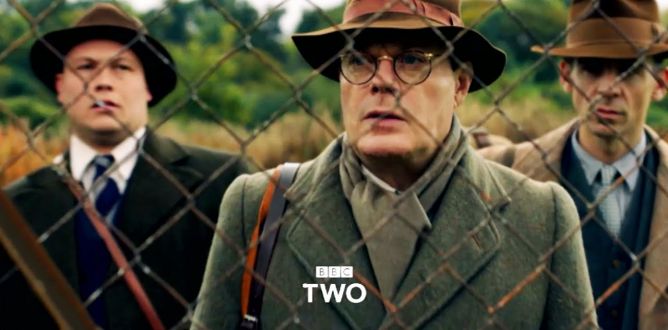Castles in the Sky Parent Guide
A solid historical film about a quirky inventor struggling to save England from the Nazis.
Parent Movie Review
It’s 1934 and a small number of English bureaucrats are increasingly uneasy with the rapid rate at which Hitler is re-arming Germany. Knowing that their government will not bolster its military spending to keep pace with the Nazi state, the civil servants form the Tizard Committee to assess anti-aircraft measures. Its chair, Henry Tizard (Alex Jennings), encourages leading scientists to submit proposals for a “death ray” that can kill pilots flying hostile aircraft.
Not surprisingly, no one comes up with a satisfactory death ray proposal. The best alternative comes from an eccentric weatherman, Robert Watson Watt (Eddie Izzard), who believes he can use radio waves to “cast a net” in the air that will catch incoming aircraft. When a preliminary test of his prototype detects a nearby plane, Watson Watt is given bare bones funding and hires fellow meteorologists to make his radar detection system a reality.
History tells us that Watson Watt’s efforts succeed and radar plays a critical role in protecting the island during the Battle of Britain. But knowing the outcome doesn’t lessen the tension in the film – the story manages to keep the viewer fully engaged as Watson Watt struggles to solve the problems of power and range that limit the effectiveness of his invention. Conflict within the group, a spy, bureaucratic in-fighting, and strains on personal relationships also ramp up the narrative tension.
Of particular interest is the role played by Winston Churchill – particularly his initial hostility to a technology that would save his country. Churchill is played by Tim McInnerny, in what is easily the worst Winston Churchill portrayal ever captured on film. McInnerny seems so preoccupied in impersonating Britain’s great prime minister that he apparently forgets to act. Thankfully, even this dreadful performance can’t sink the film – but it is irritating.
Parents seeking movies that are both educational and entertaining can confidently play this film for their teens. There is very little negative content aside from some celebratory alcohol consumption. Positive messages exist in abundance, with strong messages about never giving up and looking for solutions to thorny problems. Sacrifice is also a theme of the film, with viewers realizing the price Watson Watt pays for building the defensive system that serves as virtual “castles in the sky”, protecting his island home from invasion.
Directed by Gillies MacKinnon. Starring Eddie Izzard, Laura Fraser, Karl Davies. Running time: 90 minutes. Theatrical release June 23, 2014. Updated May 8, 2020Watch the trailer for Castles in the Sky
Castles in the Sky
Rating & Content Info
Why is Castles in the Sky rated Not Rated? Castles in the Sky is rated Not Rated by the MPAA
Violence: Two characters shove each other.Sexual Content: None noted.
Profanity: None noted.
Alcohol / Drug Use: The characters drink heavily to celebrate a breakthrough. Some of the characters chug pints of beer at a pub; the loser pours the contents of his glass on his head.
Page last updated May 8, 2020
Castles in the Sky Parents' Guide
Have you ever struggled to solve a difficult problem? What can you learn from Robert Watson Watt about working through complex issues?Loved this movie? Try these books…
The development of radar in Great Britain and the US is comprehensively handled in Robert Buderi’s The Invention that Changed the World: How a Small Group of Radar Pioneers Won the Second World War and Launched a Technological Revolution.
Home Video
Related home video titles:
Imitation Game is another film about an eccentric whose invention helps to save Britain during the war. Alan Turing is a gifted mathematician whose work to crack the Nazi’s Enigma cipher lays the foundation for the first computers.
Winston Churchill becomes Prime Minster of Great Britain when all seems lost. Darkest Hour follows his first few months in office as he deals with a divided cabinet and the seemingly inevitable slaughter of British troops at Dunkirk.

